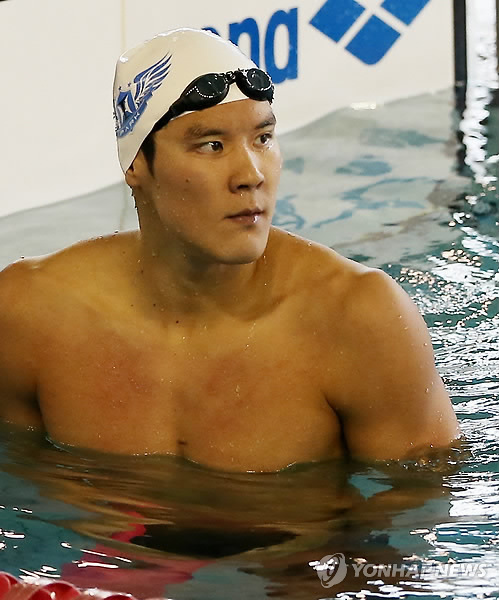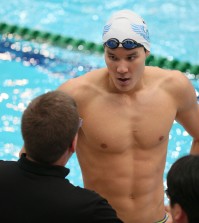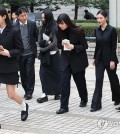- California Assembly OKs highest minimum wage in nation
- S. Korea unveils first graphic cigarette warnings
- US joins with South Korea, Japan in bid to deter North Korea
- LPGA golfer Chun In-gee finally back in action
- S. Korea won’t be top seed in final World Cup qualification round
- US men’s soccer misses 2nd straight Olympics
- US back on track in qualifying with 4-0 win over Guatemala
- High-intensity workout injuries spawn cottage industry
- CDC expands range of Zika mosquitoes into parts of Northeast
- Who knew? ‘The Walking Dead’ is helping families connect
S. Korean sports officials meet over Park Tae-hwan’s impending doping hearing

Park Tae-hwan looks at an electronic board after completing a 200-meter freestyle race at the national team trials in Gimcheon City, North Gyeongsang Province, on July 16, 2014. Park finished the race in 1:45.25, the fastest in the men’s 200m freestyle this year, outperforming the Australian swimmer Cameron McEvoy’s 1:45.58. Park will also compete in the 100m and 400m in freestyle, and 200m and 400m in individual medley to qualify for the Incheon Asian Games in September. (Yonhap)
SEOUL (Yonhap) — A team of South Korean sports officials met on Friday to discuss preparations for an upcoming doping hearing for Park Tae-hwan, a beleaguered swimmer who recently tested positive for testosterone.
Representatives from the Korean Olympic Committee (KOC), the Korea Swimming Federation (KSF) and from Park’s agency, Team GMP, met for a little over an hour behind closed doors on Friday in Seoul.
FINA, the international governing body of swimming, has set a hearing for Park on Feb. 27 in Lausanne, Switzerland. Park has already hired a Switzerland-based legal representative with expertise in doping cases.
Park, a four-time Olympic medalist and two-time world champ, submitted two urine samples to FINA on Sept. 3, as he was training for the Asian Games in the South Korean city of Incheon that opened later the same month. Both of his A and B samples came out positive.
Park, however, passed three doping tests during the Asian Games, the competition’s organizing committee said in a statement earlier this week.
Park is blaming an injection given by a doctor at a Seoul hospital for the positive results. State prosecutors investigating charges of the doctor’s professional negligence said the injection contained testosterone, a substance banned by the World Anti-Doping Agency (WADA).
According to prosecutors, officials from the hospital have claimed that they gave Park the injection to help boost his hormone levels but that they weren’t aware that testosterone was a banned substance.
The swimmer has countered that he repeatedly asked the hospital about the contents of the injection and that he was assured that the shot would be clean.
The KOC offered to open the start of the meeting to the media, and then Team GMP representatives threatened to leave the talks, which delayed the start of the proceedings by about an hour and a half.
The KSF said it would give a press briefing after the meeting but later canceled the plan.
Should Park be suspended for his doping, the suspension would begin retroactively on Sept. 3, the day FINA collected Park’s samples.
With a suspension of any length, Park will be ineligible to compete at the 2016 Summer Olympics in Rio de Janeiro under the KOC’s rules. The KOC stipulates that an athlete who has been suspended for a positive drug test may not be named to a national team for three years, starting on the day that the suspension ends. The 2016 Olympics will begin on Aug. 5.
Separate from any legal responsibility to be shouldered by the hospital, Park, one of South Korea’s most visible athletes, will likely be held accountable for the result, based on WADA’s World Anti-Doping Code.
In Article 10, titled “Sanctions on Individuals,” the code states that if an athlete can establish that he or she bears no fault or is negligent, the athlete may not face sanctions. However, one exception cited by the same code is “the administration of a prohibited substance by the athlete’s personal physician or trainer without disclosure to the athlete.”
The code also points out, “Athletes are responsible for their choice of medical personnel and for advising medical personnel that they cannot be given any prohibited substance.”












![넷플릭스 2025년 라인업 공개 [넷플릭스 제공. 재판매 및 DB 금지]](http://www.koreatimesus.com/wp-content/uploads/2025/04/20250415135202671-copy-120x134.jpg)
